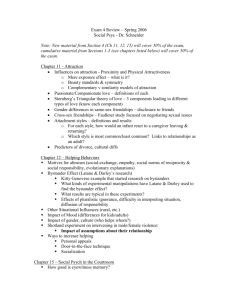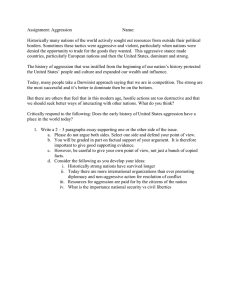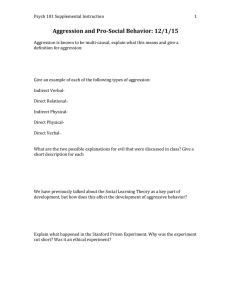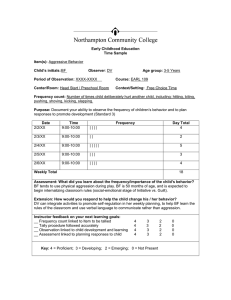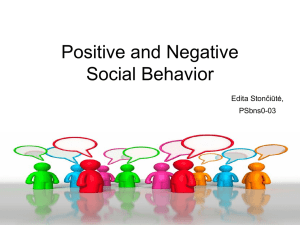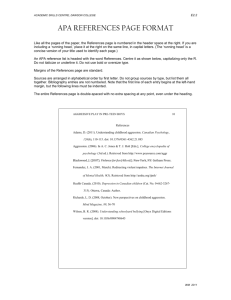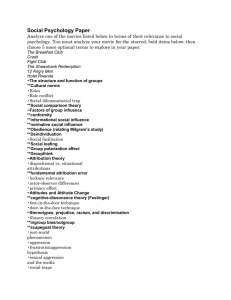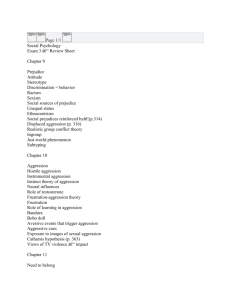Social Relations How do we relate to others?
advertisement
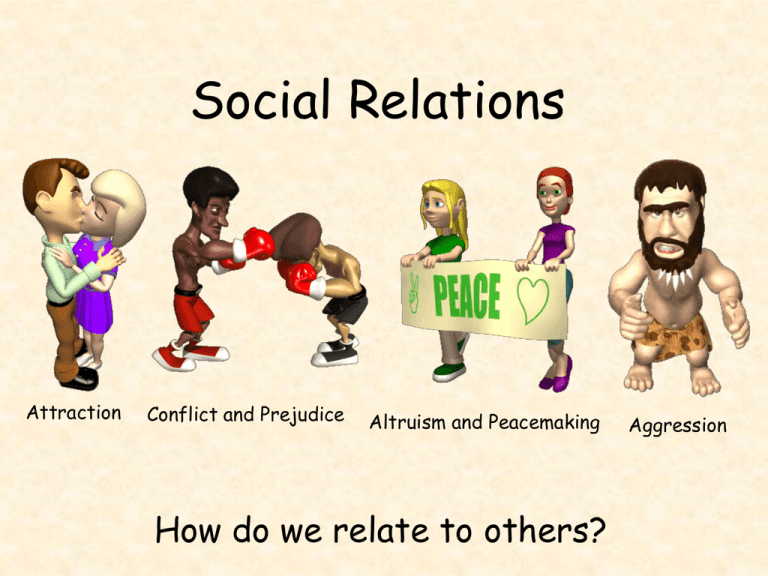
Social Relations Attraction Conflict and Prejudice Altruism and Peacemaking How do we relate to others? Aggression I love you…no wait. I hate you. I am not sure, but you are hot. Throughout your life (and in particular during high school) you will feel a lot of powerful emotions towards others. Three of the big ones will be… – Attraction – Love – Aggression Attraction being drawn towards something 5 Factors of Attraction…. • Think about your friends. What makes you like, or even fall in love with one person and ignore or react negatively to someone else? Proximity • The more you are around something, the more likely you are to be attracted to it. …ever spent a week at camp?? Mere exposure effect • Repeated exposure to something breeds liking. • And the greater exposure the more likely you will find similarity Similarity • Paula Abdul was wrong- opposites do NOT attract. • Birds of the same feather do flock together. • Similarity breeds content. • In background, attitudes, and values Reciprocal Liking • You are more likely to like someone who likes you. • Why? • Except in elementary school!!!! Liking through Association • Classical Conditioning can play a part in attraction. • If I wanted ____ to like me and I new she loved Godiva chocolate, I would start showing up every time she ate Godiva. • Godiva is the UCS and the happy feeling is the UCR. At this point I am neutral but hope to become the CS when she associates me with chocolate. • Once she experiences acquisition every time she sees me she will become happy (CR) • So don’t try to pick someone up at the dentist – they may associate you with those negative stimuli Physical Attractiveness Matching Hypothesis States that people tend to pick partners who are about equal in level of attractiveness to themselves The Halo Effect • Physically attractiveness often predicts greater success in certain areas of life – For example dating frequency (they date more). • Research shows…they are perceived as… – – – – – – Healthier happier more honest have better personalities greater job competence and more successful than less attractive counterparts. What is considered beautiful?? Beauty and Culture Are these cultures really that different? LOVE • Passionate Love: – an aroused state of INTENSE positive absorption of another. • Compassionate Love: – the deep affectionate attachment we feel for those with whom our lives are intertwined. What makes compassionate love work? • Equality • Self-disclosure Aggression • Any physical or verbal behavior intended to hurt or destroy. • Two types – Hostile – Instrumental • Hostile – Aggression that has no clear purpose – Margaret just felt angry one day and kicked the ---- out of Tyler = hostile • Instrumental – Aggression that has a purpose – Margaret wanted Tyler’s lunch money and slapped him aside the head to get his cash = aggression has a goal = instrumental • There are many theories to why aggression exists. • How would the main theorists view aggression? – Freud?? • Defense mechanism – Skinner?? • A reinforced learned behavior – Bandura?? • Observational learning The Biology of Aggression • Genetics • Neural Influences (aggression in the brain) • Biochemical The Psychology of Aggression Frustration-Aggressive Principle: • When one is frustrated they become aggressive • the blocking of an attempt to achieve some goal creates anger which generates aggression. Goals can be: •Sports or work •Relationship •Body Condition etc… Hot Weather and Aggression Can we learn to be aggressive or gentle? Bandura thought so… They can be learned…through models...but… Once learned they are difficult to change. If this is true, turn on the cartoon channel and think about what we are teaching our kids Aggression and TV Watches = • By the time you are 18, you spend more time in front of TV than in school •2/3 of all homes have 3 or more sets average 51 hours a week. •By the time a child finishes elementary school they have witnessed 8000 murders and 100,000 other acts of violence on TV •Over half of all deaths do NOT show the victim's pain •As TV watching has grown exponentially, as does violent behaviora strong positive correlation. •How do you think TV has effected sexual aggression? • Even though aggression gets most of the research… sometimes people do positive things towards each other – This is called pro-social behavior (PSB) • Altruism – Unselfish regard for the welfare of others. • However, there are some exceptions • Kitty Genovese case. Kitty Genovese and the Bystander Effect Stabbed and eventually murdered by a man in NYC while more than 35 people watched or listened Bystander Effect bystanders less willing to help if there are other bystanders around WHY??? Diffusion of Responsibility The presence of others may diffuse the sense of individual responsibility People tend to assume that someone else will take action so they need not to do so Bystander Effect #2 • Another factor influencing bystander intervention is Pluralistic Ignorance • People seem to decide what appropriate actions to take by looking at other people • If we are sitting in the classroom and we hear a really loud noise and I look at you guys and you guys do nothing…I think to myself “they must know what the noise is” and you look at me and think the same thing. And none of us do anything!! Social Exchange Theory • The idea that our social behavior is an exchange process, which we maximize benefits and minimize costs. Social Responsibility Norm • A societal rule that tells people they should help others who need help even if doing so is costly Peacemaking • Working towards superordinate goals allows people to overcome differences. • superordinate goals – Shared goals that override differences among people and require cooperation • Sherifs’ Robbers Cave Experiment • GRIT – Graduated and Reciprocated Initiatives in Tension-Reduction – A strategy designed to decrease International Tensions
